WHAT IS A CALORIE??
A calorie is a unit of energy. It is a measure of the energy that is contained in food. When you eat food, your body uses the energy from the calories to fuel various functions, such as muscle contractions, nerve impulses, and maintaining body temperature. The number of calories in food is a way of measuring how much energy that food can provide to your body. Different types of food contain different amounts of calories. For example, a serving of vegetables may have fewer calories than a serving of meat. The number of calories that you need each day depends on your age, gender, weight, height, and activity level. Most adults need to consume about 2000-2500 calories per day to maintain their weight.
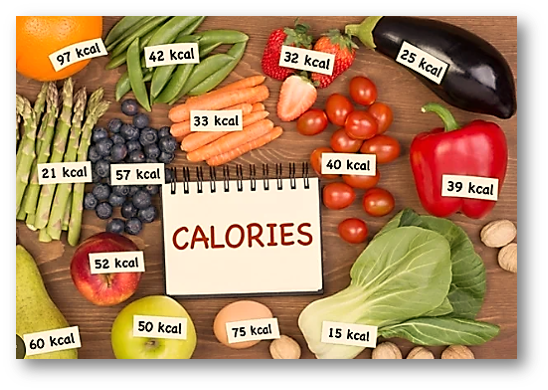
WHAT ARE THE CALORIES IN FOOD??
Calories are a measure of the energy that is contained in food. Different types of food contain different amounts of calories. For example, a serving of vegetables may have fewer calories than a serving of meat. The number of calories in food is a way of measuring how much energy that food can provide to your body.
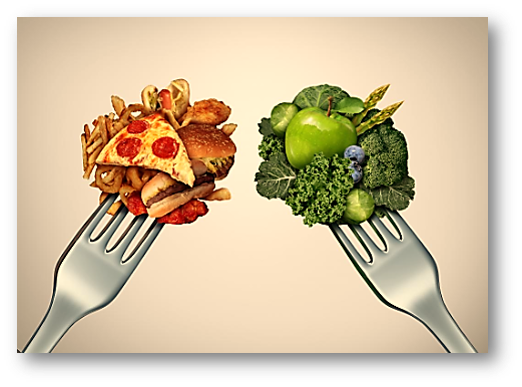
Here are some examples of the number of calories in common foods:
- 1 slice of bread: 70-80 calories
- 1 medium apple: 95 calories
- 1 cup of broccoli: 55 calories
- 1 large banana: 120 calories
- 3 ounces of chicken breast: 165 calories
- 1 cup of cooked rice: 215 calories
- 1 cup of milk: 150 calories
- 1 medium-sized potato: 110 calories
It’s important to note that the number of calories in a serving of food can vary depending on the size of the serving and the specific brand or type of food. It’s always a good idea to check the nutrition label to get an accurate count of the number of calories in a food.
WHAT ARE CALORIES IN THE BODY??
Calories are a unit of energy. When you eat food, your body uses the energy from the calories to fuel various functions, such as muscle contractions, nerve impulses, and maintaining body temperature. The number of calories that you need each day depends on your age, gender, weight, height, and activity level. Most adults need to consume about 2000-2500 calories per day to maintain their weight.
When it comes to the number of calories in your body, it’s important to understand that the number of calories that you consume and the number of calories that your body uses can be different. If you consume more calories than your body needs, the excess calories will be stored in your body as fat. If you consume fewer calories than your body needs, your body will use stored fat as energy. This is why calorie intake is an important factor in weight management. By understanding the number of calories that you need and tracking your calorie intake, you can help to maintain a healthy weight.
WHAT IS MEANT BY 1 CALORIE??
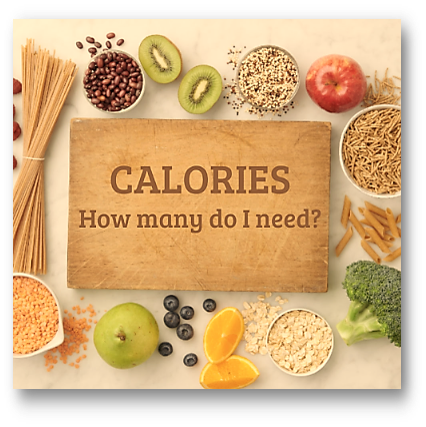
A calorie is a unit of energy. It is a measure of the energy that is contained in food. When you eat food, your body uses the energy from the calories to fuel various functions, such as muscle contractions, nerve impulses, and maintaining body temperature.
The term “calorie” is often used to refer to the number of calories that are contained in food. For example, a food label might list the number of calories per serving of a particular food. The number of calories in food is a way of measuring how much energy that food can provide to your body.
It’s important to note that the number of calories in a serving of food can vary depending on the size of the serving and the specific brand or type of food. It’s always a good idea to check the nutrition label to get an accurate count of the number of calories in a food.
The term “calorie” is also used to describe the energy that is needed or used by the body. For example, you might hear someone say that they are trying to burn 500 calories at the gym. This means that they are trying to use up 500 calories worth of energy through physical activity.
WHAT IS THE CALORIE COUNT OF THE DAY??
The calorie count is a measure of the number of calories that you consume in a day. It’s the total amount of energy that you get from the food and drinks that you consume. The number of calories that you need each day depends on your age, gender, weight, height, and activity level. Most adults need to consume about 2000-2500 calories per day to maintain their weight.
To determine your calorie count for the day, you can track the number of calories that you consume by keeping a food diary or using a food tracking app. This can help you to be mindful of your calorie intake and make sure that you are consuming the right amount of calories for your needs.
It’s important to note that the number of calories that you need may vary depending on your goals. For example, if you are trying to lose weight, you may need to consume fewer calories than you burn in order to create a calorie deficit. On the other hand, if you are trying to gain weight or build muscle, you may need to consume more calories than you burn in order to create a calorie surplus. It’s always a good idea to speak with a healthcare professional or a registered dietitian to determine the right calorie intake for your specific needs.
EXAMPLES OF HIGH-CALORIE FOODS INCLUDE!!
- Avocado
- Nuts and seeds
- Coconut oil
- Dried fruit
- Cheese
- Dark chocolate
It’s always a good idea to choose a variety of nutrient-dense foods from all food groups in order to get the nutrients that your body needs to function properly.
EXAMPLE OF A MAINTAINED CALORIE DIET!!
A maintained calorie diet is a diet that provides the right number of calories for you to maintain your current weight. The number of calories that you need each day depends on your age, gender, weight, height, and activity level. Most adults need to consume about 2000-2500 calories per day to maintain their weight.
Here is an example of a maintained calorie diet for a sedentary woman who is 35 years old, 5’5″ tall, and weighs 150 pounds:
Breakfast:
1 cup of oatmeal with 1 cup of blueberries and 1 cup of unsweetened almond milk (300 calories)
Lunch:
1 cup of quinoa with 1 cup of roasted vegetables and 3 ounces of grilled chicken (375 calories)
Dinner:
1 baked sweet potato with 1 cup of steamed broccoli and 3 ounces of baked salmon (350 calories)
Snacks:
1 small apple with 2 tablespoons of peanut butter (200 calories)
Total: 1225 calories
This is just one example of a maintained calorie diet. It’s important to note that the number of calories that you need may be different, and it’s always a good idea to speak with a healthcare professional or a registered dietitian to determine the right calorie intake for your specific needs.
HIGH-ENERGY LOW-CALORIE FOOD!!
Low-calorie foods are foods that contain a small number of calories per serving. They are a good choice for people who are trying to manage their calorie intake in order to lose weight or maintain a healthy weight. Low-calorie foods can help you to feel full and satisfied without consuming a lot of calories.
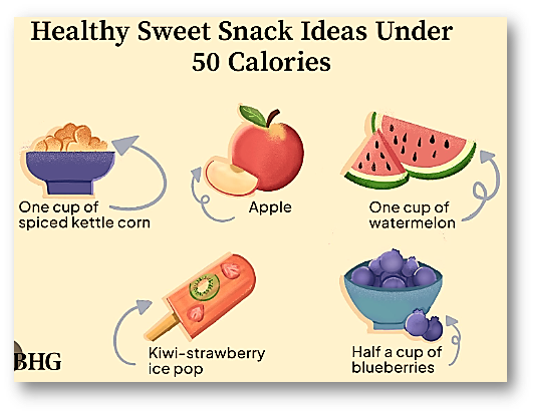
Here are some examples of high-energy, low-calorie foods:
Fruits and vegetables:
Most types of fruits and vegetables are low in calories and high in fiber, which can help to keep you feeling full and satisfied. Some examples include:
Apples
Berries
Leafy greens
Cucumbers
Carrots
Lean proteins:
Foods like chicken breast, turkey, fish, and tofu are low in calories and high in protein, which can help to keep you feeling full and satisfied.
Whole grains:
Whole grains like quinoa, oats and brown rice are low in calories and high in fiber, which can help to keep you feeling full and satisfied.
Legumes:
Beans, lentils, and chickpeas are low in calories and high in protein and fiber, which can help to keep you feeling full and satisfied.
It’s always a good idea to choose a variety of nutrient-dense foods from all food groups in order to get the nutrients that your body needs to function properly.
MYTH ABOUT CALORIE COUNT!!
There are many myths and misconceptions about calorie count and the role of calories in weight management. Here are a few common myths about calories:
Myth: All calories are created equal.
Fact: Not all calories are created equal. Different types of food contain different nutrients, and the body processes these nutrients differently. For example, a calorie from a serving of vegetables is not the same as a calorie from a serving of junk food. Vegetables are nutrient-dense and provide a variety of health benefits, while junk food is high in added sugars and unhealthy fats and may contribute to weight gain and other health problems.
Myth: Low-calorie foods are always healthy.
Fact: Just because a food is low in calories does not necessarily mean that it is healthy. Some low-calorie foods may be nutrient-poor and not provide much in the way of health benefits. It’s important to choose a variety of nutrient-dense foods in addition to low-calorie options.
Myth: Counting calories is the key to weight loss.
Fact: While calorie intake is an important factor in weight management, it’s not the only factor. Other factors, such as the quality of the calories that you consume, the types of foods that you eat, and your activity level, also play a role in weight management. It’s important to focus on overall healthy eating and lifestyle habits, rather than just calorie counting, for long-term weight management success.
It’s always a good idea to speak with a healthcare professional or a registered dietitian to get accurate and reliable information about calorie intake and weight management.
REFERENCES:
https://asset-pdf.scinapse.io/prod/876950832/876950832.pdf
https://www.academia.edu/download/61716716/article220200108-35604-79pjr1.pdf

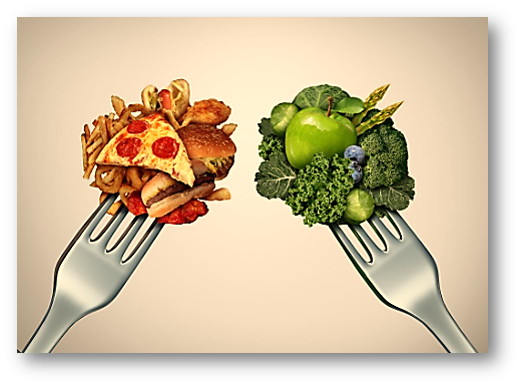
Pingback: WALK, IS THE SIMPLEST WAY TO FEEL ALIVE!! - Life Biologs
Pingback: PCOS OR PCOD!! - Life Biologs
Pingback: IMMUNITY AND IMMUNE BOOSTERS!! - Life Biologs